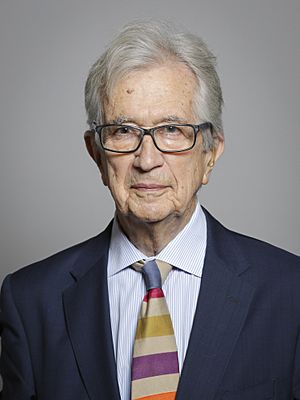Bill Rodgers, Baron Rodgers of Quarry Bank facts for kids
Quick facts for kids
The Lord Rodgers of Quarry Bank
|
|||||||||||||||||||||||||||||||||||||||||||||||||||||||||||||||||
|---|---|---|---|---|---|---|---|---|---|---|---|---|---|---|---|---|---|---|---|---|---|---|---|---|---|---|---|---|---|---|---|---|---|---|---|---|---|---|---|---|---|---|---|---|---|---|---|---|---|---|---|---|---|---|---|---|---|---|---|---|---|---|---|---|---|

Official portrait, 2019
|
|||||||||||||||||||||||||||||||||||||||||||||||||||||||||||||||||
| Leader of the Liberal Democrats in the House of Lords | |||||||||||||||||||||||||||||||||||||||||||||||||||||||||||||||||
| In office 19 December 1997 – 7 June 2001 |
|||||||||||||||||||||||||||||||||||||||||||||||||||||||||||||||||
| Leader | |||||||||||||||||||||||||||||||||||||||||||||||||||||||||||||||||
| Preceded by | The Lord Jenkins of Hillhead | ||||||||||||||||||||||||||||||||||||||||||||||||||||||||||||||||
| Succeeded by | The Baroness Williams of Crosby | ||||||||||||||||||||||||||||||||||||||||||||||||||||||||||||||||
| Secretary of State for Transport | |||||||||||||||||||||||||||||||||||||||||||||||||||||||||||||||||
| In office 10 September 1976 – 4 May 1979 |
|||||||||||||||||||||||||||||||||||||||||||||||||||||||||||||||||
| Prime Minister | James Callaghan | ||||||||||||||||||||||||||||||||||||||||||||||||||||||||||||||||
| Preceded by | John Gilbert | ||||||||||||||||||||||||||||||||||||||||||||||||||||||||||||||||
| Succeeded by | Norman Fowler | ||||||||||||||||||||||||||||||||||||||||||||||||||||||||||||||||
|
|||||||||||||||||||||||||||||||||||||||||||||||||||||||||||||||||
|
|||||||||||||||||||||||||||||||||||||||||||||||||||||||||||||||||
|
|||||||||||||||||||||||||||||||||||||||||||||||||||||||||||||||||
| Personal details | |||||||||||||||||||||||||||||||||||||||||||||||||||||||||||||||||
| Born | 28 October 1928 Liverpool, England |
||||||||||||||||||||||||||||||||||||||||||||||||||||||||||||||||
| Political party | Liberal Democrats (1988–present) | ||||||||||||||||||||||||||||||||||||||||||||||||||||||||||||||||
| Other political affiliations |
|||||||||||||||||||||||||||||||||||||||||||||||||||||||||||||||||
| Spouse |
Silvia Szulman
(m. 1955; died 2006) |
||||||||||||||||||||||||||||||||||||||||||||||||||||||||||||||||
| Children | 3 | ||||||||||||||||||||||||||||||||||||||||||||||||||||||||||||||||
| Alma mater | Magdalen College, Oxford | ||||||||||||||||||||||||||||||||||||||||||||||||||||||||||||||||
William Thomas Rodgers, also known as Lord Rodgers of Quarry Bank, is a British politician. He was born on October 28, 1928. He has been a member of different political parties throughout his career.
He was a Member of Parliament for the Labour Party. He served as the Secretary of State for Transport from 1976 to 1979. Later, he was one of four important Labour politicians who left to start the Social Democratic Party (SDP). He then helped the SDP join with another party to form the Liberal Democrats in 1988. From 1997 to 2001, he led the Liberal Democrats in the House of Lords.
Contents
Early Life and Education
William Rodgers was born in Liverpool, England. He went to Quarry Bank High School in Liverpool. After school, he served in the military for a short time.
He then went to Magdalen College, Oxford to study history. From 1953 to 1960, he was the general secretary of the Fabian Society. This group helps shape ideas for the Labour Party. He also served as a local councillor in St Marylebone Borough Council from 1958 to 1962.
Rodgers played a key role in convincing the Labour Party to change its mind about nuclear weapons in 1961. He wanted Britain to keep its nuclear weapons.
Political Journey
Starting in Parliament
Rodgers first became a Member of Parliament (MP) in 1962. He represented the area of Stockton-on-Tees. He worked in Labour governments led by Harold Wilson and James Callaghan.
In 1976, he became the Secretary of State for Transport. He held this important job until the Labour Party lost the general election in 1979.
Forming the SDP
After the 1979 election, the Labour Party started to change its direction. Rodgers felt it was moving too far to the left. So, in 1981, he joined three other senior Labour politicians. These were Shirley Williams, Roy Jenkins, and David Owen. Together, they formed a new party called the Social Democratic Party (SDP). They were often called the "Gang of Four."
In 1982, Rodgers tried to become the president of the SDP. However, he did not win the election.
Life After Being an MP
In the 1983 general election, Rodgers lost his seat in Parliament. The SDP and Liberal Party had joined forces, but they did not win many seats.
For a while, he was not an MP. During this time, he worked as the Director-General of the Royal Institute of British Architects. He also became the Chairman of the Advertising Standards Authority. This group makes sure adverts are honest.
Joining the Liberal Democrats
In 1987, Rodgers led a campaign to merge the SDP with the Liberal Party. This merger created the Liberal Democrats party.
In 1992, he became a life peer. This means he was given a special title and a seat in the House of Lords for life. He was known as Baron Rodgers of Quarry Bank. In the House of Lords, he spoke for the Liberal Democrats on home affairs from 1994. He then led the party in the Lords from 1997 to 2001.
Rodgers wrote a book about his life called Fourth Among Equals. This title showed that he was seen as the least famous of the four people who started the SDP.
He retired from the House of Lords on December 12, 2023.
Family Life and Health
In 1955, William Rodgers married Silvia Szulman. She was an artist and writer. They had three daughters together: Rachel, Lucy, and Juliet. Silvia passed away in 2006.
In 2001, Rodgers had a stroke. He received treatment and speech therapy. He later said he was very lucky not to have any lasting physical damage. Since then, he has supported better care for people who have had strokes.
 | Emma Amos |
 | Edward Mitchell Bannister |
 | Larry D. Alexander |
 | Ernie Barnes |

